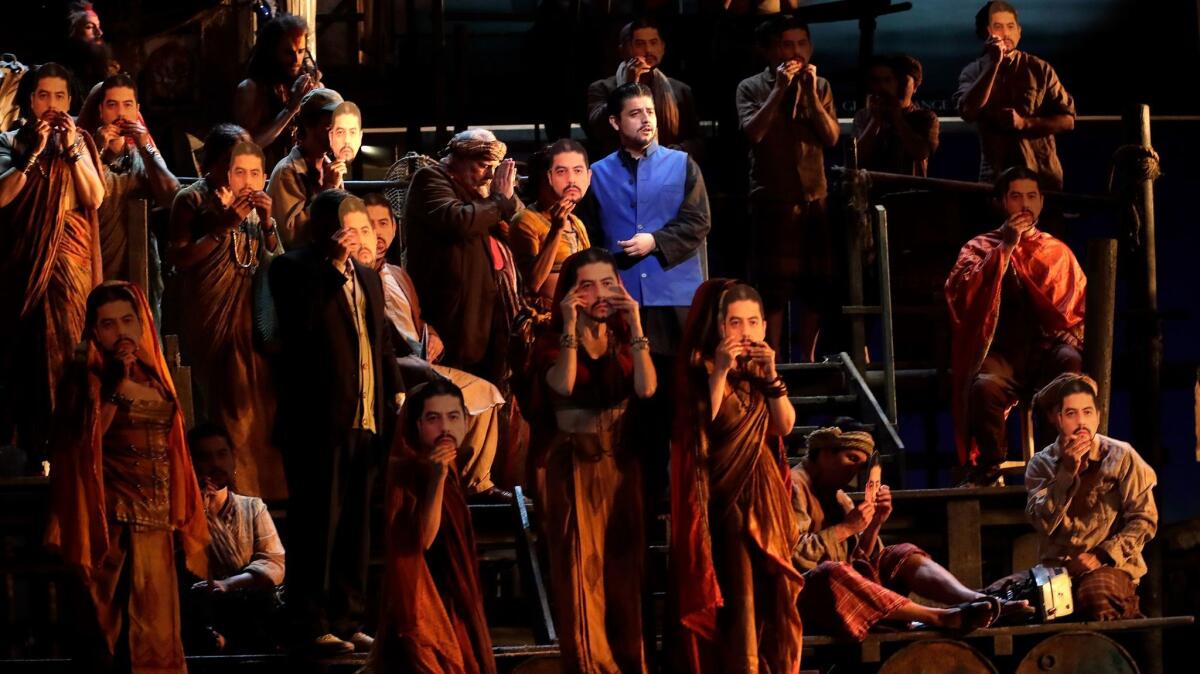Review: L.A. Opera’s ‘Pearl Fishers’: Stunning production dives deep for meaning

- Share via
As usual, Plácido Domingo received an excitedly warm round of applause as soon as he was seen entering the Dorothy Chandler Pavilion pit Saturday night to conduct Bizet’s tropical love triangle, “The Pearl Fishers.” Applause then started all over again the instant the orchestra began a seductive melody and projections on a scrim wondrously turned the stage into a deep sea with acrobatic divers.
After a dispiriting “Carmen” that opened the season, and after a number of less-than-enchanting productions of late, Los Angeles Opera is finally back. Come, of course, for the tunes in this generally discounted first opera by the composer of “Carmen.” Come for the visual spectacle and very fine singers. Stay for the ideas. And while you’re at it, you will see, thanks to Penny Woolcock’s startling production, a little something about what’s wrong with our troubled world.
There is, frankly, not much to “Pearl Fishers,” a possibly offensive (were it not silly) example of 19th century French Orientalism. Bizet was 24, with a melodic gift that didn’t stop giving big time. But the exotic libretto is hopeless in the tradition of exotic French grand opera. Other than the score’s big numbers, it contains swatches of boiler-plate that only hint at the inspiration of “Carmen,” written 11 years later, just before Bizet died at age 36.
Pearl fishers in ramshackle but otherwise paradisiacal Ceylon (now Sri Lanka) elect Zurga their leader just as his oldest friend, Nadir, shows up. They had a falling out over Leïla, a chaste Hindu priestess with enthralling eyes. They claim to have gotten over it. Then she too shows up.
Nadir has a passionate affair with Leïla in violation of her religious vows. Zurga jealously sentences both to death, but he lets them off at the last minute when he discovers that long ago, Leïla had saved his life. As an operatic aside, he sets a distracting fire to help them get away, killing any number of innocent villagers. The opera ends with a triumphant trio designed to produce empathy for a mass murder.
Woolcock, a British filmmaker, created the production for English National Opera. It then traveled from London to the Metropolitan Opera, where it charmed New York audiences. The sets (Dick Bird) and costumes (Kevin Pollard) are glorious. The use of hi-tech oceanic projections (59 Productions) along with low-tech oceanic stage effects is strikingly imaginative.
But the charm is pure deception. What lies beneath paradise intrigues Woolcock, who has been all but ignored by Hollywood. She’s made a movie about rival gangs and looked into the effects of crushing poverty and drugs in inner-city Leeds. Her operatic credentials including filming John Adams’ “The Death of Klinghoffer” with gripping documentary-style realism.
Even that bewitching cinematic opening of “Pearl Fishers” has a dark subtext. Woolcock’s NC-17-rated 2003 feature, “The Principles of Lust” — dismissed for its sex, drugs and violence, and yet in fact a cogent expression of contemporary social angst — opens with the nearly the same image: a naked, out-of-work writer floating in a tank. To some extent, this is the suffocating dream of these pearl fishers too, the world around them crashing.
Woolcock sees in Zurga, presumably just one of the crowd, someone more threatening. She has the villagers cover their faces with his image in cultish approbation. She suggests both the cultural and physical vulnerability of this idyllic seaside community. When the scrim comes down for set changes, tsunami waves are projected showing scenes of destruction that look as though they might have been shot the recently in St. Martin or Puerto Rico.
Given Woolcock’s experience documenting society’s violence, it is no surprise that she also knew exactly what to do with her Zurga, Mexican baritone Alfredo Daza, when the singer came to town relying on a cane. This was Daza’s first time back onstage after having been mugged last May in Berlin, suffering multiple fractures. Woolcock restaged the part for him, using Daza’s cane and limp not for sympathy but as a sign of his anger, his frightening underlying edge.

Although Daza has been in several L.A. Opera productions in the last 15 years, this was by far his most theatrically compelling performance, and he proved perfect foil for the secure, brightly eloquent tenor Javier Camarena, also from Mexico, making his company debut. Their duet, which opens the opera and is its best-known number, left a remarkable aftertaste of bitterness under its irresistible lyric sweetness, brilliantly setting the stage for the drama.
A scorching Leïla, Nino Machaidze is less Lorelei than femme fatale. The Georgian soprano seems to come on too strong at first for her goody-goody lyrical aria, but her captivating ferocity proves a strong and exciting feminist indictment on this male-dominant, religiously restrictive society that includes her priestly minder, Nourabad. That falls to imposing bass baritone Nicholas Brownlee, in the costume as if an Indian fakir.
Woolcock also takes advantage of the excellent L.A. Opera chorus to demonstrate how a community focused on elusive riches (in this case buried pearls) creates a readiness, and even eagerness, for the exploitation by demagoguery. Domingo stresses this in his conducting, where aggression, or at least activity, reins over lyrical reflection.
There was further significance to this night. On Oct. 7, 1986, the company made its debut, with then-tenor Domingo starring in Verdi’s “Otello.” Thirty-one years later to the day, and after too may ups and downs to count, L.A. Opera managed to once more matter.
♦ ♦ ♦ ♦ ♦ ♦ ♦ ♦ ♦ ♦
L.A. Opera ‘The Pearl Fishers’
Where: Dorothy Chandler Pavilion, 135 N. Grand Ave., Los Angeles
When: 2 p.m Sunday and October 22; 7:30 p.m. October 19, 25 and 28 (Grant Gershon conducts October 25 and 28)
Cost: $16-$304 (subject to change)
Info: (213) 972-8001 or LAOpera.org
Running time: 2 hours and 30 minutes
MORE ARTS NEWS AND REVIEWS:
Why 1791 in 2017? Gustavo Dudamel and Mozart’s last year
Ai Weiwei and the global refugee crisis, on film
Jonathan Biss on why ‘piano is daily bread’
More to Read
The biggest entertainment stories
Get our big stories about Hollywood, film, television, music, arts, culture and more right in your inbox as soon as they publish.
You may occasionally receive promotional content from the Los Angeles Times.











